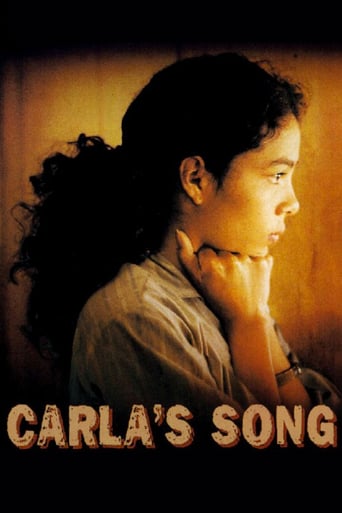valis1949
In CARLA'S SONG, Ken Loach focuses his brand of UK social realism on The Contras and Sandinistas. The film recounts the story of a Scottish bus driver, played by Robert Carlyle, who falls in love with a beautiful woman from Nicaragua. She has been physically and psychically wounded in the revolutionary conflict of that country, and they both journey to Nicaragua in an attempt put her life back together. At face value, this seems like a weak or far fetched premise for a film, yet CARLA'S SONG demonstrates a very real and intense chemistry between the two lovers. Robert Carlyle is most convincing with his extemporaneous ad libs and off-hand comments, and they really added a sincere warmth to his character. However, subtitles were desperately needed for the Spanish speaking parts of the film, and a large chunk of the Scottish dialog was nearly uninterpretable. Overall, CARLA'S SONG renders an accurate portrait of 1980's working poor in Scotland, and a realistic view of the Sandinista Freedom Fighters as seen through the prism of a world class love affair.
cmorales
I am Nicaraguan by birth, but stayed away from politics while I lived in that country, although my family and myself experienced the anxiety, and sometimes the horror, of living under a totalitarian regime, even one supported by the US, such as the Somoza dynasty. Although I left for the USA three years before the final triumph of the Sandinista revolution, I visited the country many times during the Sandinistas' 10-year rule, and saw first-hand the good and bad sides of the revolution, as well as the economic hardships caused by President Reagan's (though Olly North and the CIA) support of the counter-revolutionary thugs called "contras", who decimated a whole generation of young people in that unfortunate country.I watched this movie last night and was impressed by how true to life Ken Loach managed to keep it. Although to some people it might appear as propaganda, my own experience tells me that everything that was depicted in the film (as far as the situation in Nicaragua in 1987 is concerned) was very realistic. The enthusiasm, especially among the poor and young for the revolution was true, I saw it with my own eyes. The fervor of the literacy campaign volunteers was admirable, even though some of them were targeted as "strategic" targets by the contra forces. Also targeted for destruction were health centers (which had never before existed in many remote villages), grain silos, tobacco sheds, etc., in the areas bordering Honduras, which is where Carla's family lives. The nighttime contra raid was very realistic, I must say, even though I myself never had to live through one. But I knew people who did. The cruelty of the contras depicted in the movie was well documented by American and other media at the time.Oyanka Cabezas' portrayal of the young woman is remarkable, and Robert Carlyle's young bus driver is spot-on. The role of Scott Glen as a reformed CIA agent, although good, is the only one I could find fault with for being a little political and perhaps preachy, but I think his comments were based on facts.In summary, I enjoyed the film very much. You don't have to be political to appreciate injustice, poverty, love and human decency. These human vices and virtues are all very well portrayed in this story. Kudos to all involved in its making.
mctrane
Ken Loach is a remarkable storyteller. Notice how subtly Carlyle's George changes from a loveable lout to noble lover; now find a recent Hollywood film that accomplishes something even close. Moving dramatically from the grey grime of Glasgow to the green pandemonium of Nicaragua in 1987, this film charts a remarkable story of how international politics becomes an international dance of love becomes international politics.The reviewer who argues that the film glorifies the Sandinistas has it all wrong (except perhaps in the world of doublespeak where simply to treat the Sandinistas with sympathy is to glorify them . . .) Loach rather glorifies the kind of loving devotion that leads George to make a remarkable self-abnegating gesture at the end of the film. Even as I believe that the film is primarily about the love between Carla and George, I am happy for the legions of viewers in the U.S. who, upon watching this film, might be inspired to investigate what the U.s. was up to in Nicaragua in the 1980's. As Noam Chomsky so calmly puts it, U.S. involvement in sponsoring terrorism against the Sandinista government is a completely "non-controversial" issue (underlying strong, though naturally unenforceable acts of censure against the U.S. from both the World Court and U.N.). In the film, Scott Glenn has a few nice moments articulating this position. Very worthwhile. And when we finally hear Carla's song, it is moving indeed.
Serpico-7
It is easy to overlook this Ken Loach film. Critics had not been so kind about the excellent Land and Freedom as they had been in the past, and Carla's song didn't fare that well either. It seems difficult to understand why. The inimicable brand of social realism is there as is the focus on the experiences and emotions of the individual. There is even the trademark visual in-joke.More than any other character in the recent past I cared for Carla. All performances are exceptional. What we have here is social realism that expands into political statement and ultimately human tragedy.If at all possible, try to see this film. Carlisle's broad Scottish accent may make it difficult to follow for the non-initiated, but persevere, and you will be rewarded.




